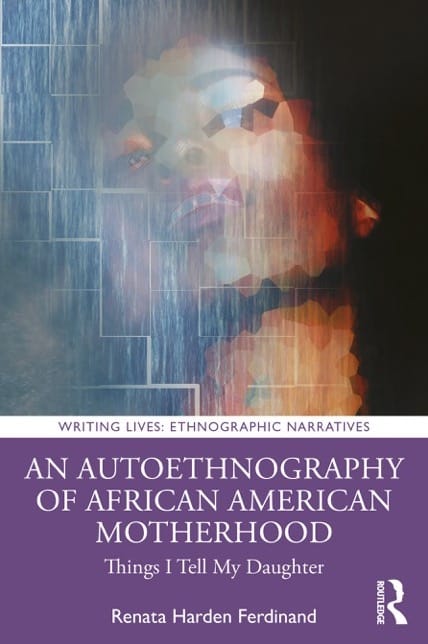Book Review: How Do We Understand Black Girl Identity?
“This is a messy document,” writes Renata Harden Ferdinand in her poignant, lucid An Autoethnography of African American Motherhood: Things I Tell my Daughter. That may be so, to the extent that real life is messy, and autoethnographic writing is meant to stay close to the real. What it is not is messy writing, nor messy critical thinking as I’ll explain in this book review. The book is clear in its aims: “My goal is to offer a text that allows for an expansive understanding of Black girl identity.” As such, the author shares and unpacks her lived experience as both, daughter to a Black woman and mother to a Black girl. In doing so, she also offers keen insight on recent cultural and political events that have proven significant for Black women in the US. These events—Michelle Obama as First Lady, example—find purchase in the author’s day to day, as she strives to give her daughter the very best of herself to prepare her for the brutal complexities of Black American life. Ferdinand explains: “And in that lies a significant problem with Black motherhood: teaching and preparing children in the present day based on historical memory. And not just any memory— a brutal memory filled with extreme savagery, domination, and oppression…”
One of the more intriguing aspects of Ferdinand’s work is her writing style: colloquial, direct, jargon-free. The ‘mess’ she refers to pertains to her decision to present her keen socio-cultural analysis as if the book we are reading were still a work in progress. Readers get to ‘see’ her react to the events as they unfold: “Damn Damn Damn!” And we also get to ‘see’ her work through the emotions these events stir: “I’m calmer now.” This is a unique triumph in scholarly writing, as it fosters a sense of proximity with the author, and—for the most part—makes the reading that much more engaging, allowing perhaps for a higher level of understanding. The only drawback of this approach is that in handling fellow scholars’ theories and concepts, the author— instead of working the quoted material into the more colloquial register of the text— simply peppers it in. As a result, the book assumes a collage-like aesthetic that would likely only be understood by readers already in the know, thus leaving more general audiences without the necessary coordinates to follow the theoretical currents the author references and draws from.
“But damn it! Somebody died so I can do everything! I can’t even take a step without remembering that somebody died for me to be able to do that. The burden of not forgetting falls squarely on my shoulders.”
Renata harden ferdinand
The underlying theme of the book—as it pertains to autoethnography more broadly—and which Alec Grant raises in his foreword, is what concerns or constraints, if any, should researchers have when scrutinizing their lived experience for stories to tell, seeing as these stories will inevitably involve others. Grant argues: “Risk-averse autoethnographic inquiry is anodyne, unexciting and unengaging, and attempts to police this within the discipline of qualitative inquiry run the risk of driving risk-welcoming autoethnography to the samizdat underground.” These issues explicitly come up in the book’s closing section, where Ferdinand not only admits to including aspects of her mother’s life the elder woman had explicitly asked her not to write about, but also admits to hoping that her mother doesn’t read the book. Thus, for Grant and Ferdinand, the question seems settled: autoethnographers should not burden ourselves with concerns as to how the people who are unwittingly involved in our research might feel about their involvement. The question, however, should remain open. Especially when one considers that autoethnography is not straight documentation: we choose who and what to include in our writing and how to present them. That we present ourselves with vulnerability and scholarly rigor does not deny the fact that the host of other names and lives who appear in our work have not necessarily consented to ‘participate’ in our research; rather they are being made vulnerable by our desire to tell our story to the world at the service of cultural criticism and social theory.
These concerns notwithstanding, where Ferdinand is at her best is in those instances where she focuses on herself, in relation to both her mother and daughter, and in consideration of the historical positioning of Black women in American society. She writes: “But damn it! Somebody died so I can do everything! I can’t even take a step without remembering that somebody died for me to be able to do that. The burden of not forgetting falls squarely on my shoulders.” It’s not simply that her writing will strike readers as sincere, which it does. It’s that the author can offer lightning-quick summaries of the intricacies of living under multiple systems of oppression and of how these systems play out day to day, as well as the effect they have on one’s inner-life. In this precise sense, while An Autoethnography of African American Motherhood is designed to appear as a work in progress, what it really is is a testament for those living in a social and political context premised on them having no life at all.
An Autoethnography of African American Motherhood: Things I Tell my Daughter
Routledge, 2021
ISBN: 978-0367422318
148 pages; $48.95
Note: As an Amazon affiliate we may receive money from your clicks/purchases; thank you for your support!
Featured Image by 5540867 from Pixabay I The AutoEthnographer











